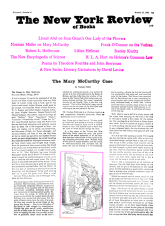The beautiful city of Edinburgh with the severe lines of the Castle and the Palace sitting high above was washed with rain during the entire week of the International Drama Conference. God was right. Last year the Edinburgh Festival sponsored a conference on the novel and became well-known for some highly seasoned confessions of homosexuality, dope-taking, and boiling praise of William Burroughs. This year, perhaps conscious that the days were tame and ambling by comparison, “a happening” was staged on the final day by a young American director and his American aides. “A happening” is an improvised entertainment and this one included a naked girl being wheeled across the organ platform on a TV trolley. Maybe the girl was improvised, although she said she was paid four guineas ahead of time and would do it all over again, but you cannot improvise a TV trolley and I guess you don’t improvise a taste for newspaper headlines.
The Drama Conference took place in McEwan Hall. Around the dome of this ugly nineteenth-century building run the words from Proverbs, “Wisdom is the Principal Thing.” Maybe, but not that week. About sixty delegates from many countries sat on the platform with Kenneth Tynan, as over-all chairman, and there was a new chairman for each day’s discussion. The whole affair seemed to be managed by John Calder, the publisher, as deep a worrier about paid public attendance as any Broadway producer. He had cause to worry. The first day’s audience, over two thousand, fell as the days passed, to under five hundred, and they could have been relatives.
There has long been a theory that the best actors are those who lead their emotional lives upon a stage. For many years I have been working on a theory that everybody in the theater—playwright, director, stage designer, prop man—are actor manqué. During the conference my theory became scientific fact. People who might have talked seriously among themselves were given an audience, TV cameras, and newspaper reporters. Heady stuff for actors manqué and designed, of course, to make words and ideas seem less important than personalities. For example, Arthur Adamov, a Frenchman who has written a number of interesting plays, became the Shirley Temple of the conference, although Shirley Temple was never so conscious of her charm. But Mr. Adamov was not alone.
The first day opened with the discussion, “Who makes today’s theater? The playwright, the director, or the actor?” A subject with built-in irritability. Obviously a fight had been counted on, but none came. I was part of that day’s panel, spoke briefly and not very well, and did not speak again. I did not want to speak again and nobody wanted me to. (Perhaps washouts are not the best reporters, but I’ve tried to deal here only with facts.) That day, Joan Littlewood, who is the most inventive and original talent in the English theater, made a warm-hearted but unfortunate speech that served as the first sign that great talent is not always proof of public intelligence, and maybe should not be tested as such.
The first day had been timid and dull, and so, on the next day, what seemed to me a planned hell broke loose. It need hardly be said that the word “Brecht” had been as common as the word “the” when Tynan announced that the British Government had refused entry to Mrs. Brecht and her associates. This was properly condemned by all of us—East German Trade delegations come in and out freely, but then that’s money—except Bernard Levin, a London critic and TV personality. His flamboyant speech made all of us uncomfortable and caused Wolf Mankowitz to grow angry—Levin said Mankowitz was known as 90 per cent Mankowitz: obviously a local joke—and Mankowitz said Levin was the first Jewish fascist. Mr. Mankowitz has had a sheltered life.
The third day’s session was mostly about the cinema and television. Mr. Robbe-Grillet told us of the philosophical considerations that had turned him to the cinema. It was all very high class, but perhaps writers should not explain themselves or have such well-thought-out reasons for why they do what they do. On that day Harold Pinter, a dignified young man, made good sense, Olivier made a charming speech, and Alec Guinness listened for a short time and modestly disappeared. By the fourth day national characteristics showed clearly: the American delegation made jokes and looked unhappy, the Russian delegation was prim, the French dealt in generalities, the English delegation spoke very good English, and the ex-Germans and Swiss made practical suggestions that were thoroughly impractical at such a conference.
Each night a pleasant party was given by kind, well-heeled residents of Edinburgh. I skipped most of the parties and heard a fine concert by Stern, Istomin, and Rose, and saw Alec Guinness in Ionesco’s play Exit the King, about which W. A. Darlington, a London drama critic, wrote a remarkable sentence, “Either this is a masterpiece or I have no judgment at all.” Mr. Darlington has no judgment at all. Or perhaps he was the victim of that fashionable disease which caused the conference to come out in a rash—the need of the well-established to be anti-established, the belief that to question the work of the avant garde is to be square. Ibsen goes and Ionesco comes. Ionesco goes and Ibsen returns. But the rash came out on all of us, and Tynan as the host, was forced to look over one famous shoulder to a possibly more famous shoulder, and over that shoulder to see who might be famous in the years to come. Fashion, as every society lady knows, takes a lot of doing and changes fast and the really expert practitioners of fashion never buy clothes in early September.
Advertisement
—Lillian Hellman
This Issue
October 17, 1963



